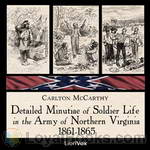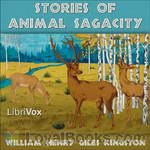|
Books Should Be Free Loyal Books Free Public Domain Audiobooks & eBook Downloads |
|
|
Books Should Be Free Loyal Books Free Public Domain Audiobooks & eBook Downloads |
|
Top Authors |
|---|
|
Book type:
Sort by:
|
By: Anton Chekhov (1860-1904) | |
|---|---|
 Ward No. 6
Ward No. 6
The line between sanity and insanity is blurred in this classic novella by Anton Chekhov. The disillusioned idealist Dr. Rabin is in charge of a provincial lunatic asylum, overseeing with weary, dubious policies a motley group of patients, a group that mirrors in microcosm all of human and especially Russian society. Seeking answers to profound questions, Dr. Rabin enters into dialogues with both staff members and patients, trying to make sense out of what has become of his life, until it becomes less and less clear who is the doctor and who is the patient... | |
 Kashtanka
Kashtanka
"Kashtanka," a shaggy-dog story penned by Anton Chekhov in seven parts and first published in 1887, relates the experiences of its eponymous heroine, a fox-faced, reddish dachshund-mix, whose name means 'little chestnut.' After her detestation of music causes her to become separated from the carpenter with whose family she had been living, Kashtanka finds herself taken up by an unusual vaudevillian and goes to live among an assortment of other intelligent animals, each of whom is observed with the characteristic empathy and humor that stamp Chekhov's work. | |
 Ivanov
Ivanov
Nicolai (anglicised Nicholas in this translation) Ivanov, a middle-aged public servant, is unhappy. His wife Anna, disinherited by her family after converting from Judaism, is dying of tuberculosis. He is deeply in debt. And his best friend’s daughter is infatuated with him. Comedy and tragedy ensue in truly Chekhovian fashion. An example of the young Chekhov’s maturing style, Ivanov is an early harbinger of themes that would recur throughout his work. | |
 Note-Book of Anton Chekhov
Note-Book of Anton Chekhov
| |
 Love
Love
| |
 Schoolmaster and Other Stories
Schoolmaster and Other Stories
Anton Chekhov, perhaps better known as a world famous classical playwright for works such as "Uncle Vanya" and "The Cherry Orchard" was also a prolific short story writer. "The Schoolmaster and Other Stories" is one of several of his collections. It's a compilation of 30 short stories. Some bizarre, some comical but all very interesting. | |
 The Party
The Party
| |
 The Slanderer 1901
The Slanderer 1901
| |
By: Harold W. Fairbanks (1860-1952) | |
|---|---|
 The Western United States: A Geographical Reader
The Western United States: A Geographical Reader
“In preparation of this book the author has had in mind the needs of the upper grammar grades. The subject matter has not been selected with the object of covering the field of Western geography in a systematic manner, but instead the attempt has been made to picture as graphically as may be some of its more striking and interesting physical features, and the influence which these features have exerted upon its discovery and settlement.” (from the Preface of The Western United States) | |
By: United States Arms Control and Disarmament Agency | |
|---|---|
 Worldwide Effects of Nuclear War: Some Perspectives
Worldwide Effects of Nuclear War: Some Perspectives
This is a concise yet thorough explanation of what might happen to our world in the aftermath of a nuclear war. The myriad of potential effects will be global and wide-spread, and the potentials are glazed over in this short work. | |
By: Carlton McCarthy (1847-1936) | |
|---|---|
 Detailed Minutiae of Soldier Life in the Army of Northern Virginia, 1861-1865
Detailed Minutiae of Soldier Life in the Army of Northern Virginia, 1861-1865
The author, who fought as a private in the Army of Northern Virginia during the Civil War, describes the Confederate soldier’s daily struggles with hunger, illness, fear, and the perils of combat; as well as his pride of service, love of comrades, and courage in the face of overwhelming odds | |
By: Abbie Farwell Brown | |
|---|---|
 The Christmas Angel
The Christmas Angel
Disagreeable old Miss Terry spends her Christmas Eve getting rid of toys from her childhood toy box. One by one she tosses them onto the sidewalk in front of her house, then secretly watches the little scenes that occur, which seem to confirm her belief that true Christmas spirit does not exist. Then the Angel from her childhood Christmas tree appears to show Miss Terry that she has not yet witnessed the final act of each of those little dramas...Living Age magazine in 1910 observed of The Christmas... | |
 Curious Book of Birds
Curious Book of Birds
Now the interesting facts about birds we have always with us. We can find them out for ourselves, which is a very pleasant thing to do, or we can take the word of others, of which there is no lack. But it is the quaint fancies about birds which are in danger of being lost. The long-time fancies which the world's children in all lands have been taught are quite as important as the every-day facts. They show what the little feathered brothers have been to the children of men; how we have come to like some and to dislike others as we do; why the poets have called them by certain nicknames which we ought to know; and why a great many strange things are so, in the minds of childlike people. | |
 The Flower Princess The Flower Princess; The Little Friend; The Mermaid's Child; The Ten Blowers
The Flower Princess The Flower Princess; The Little Friend; The Mermaid's Child; The Ten Blowers
| |
 John of the Woods
John of the Woods
| |
By: Octavus Roy Cohen (1891-1959) | |
|---|---|
 Midnight
Midnight
The crime seemed to have lost itself in the sleety cold of the December midnight upon which it was committed. The trails were not blind–there were simply no trails. The circumstances baffled explanation–a lone woman entering an empty taxicab; a run to a distant point in the city; the discovery of the woman’s disappearance, and in her stead the sight of the dead body of a prominent society man–that, and the further blind information that the suit-case which the woman had carried was the property of the man whose body was huddled horribly in the taxicab. | |
By: John L. Cotter (1911-1999) | |
|---|---|
 New Discoveries at Jamestown
New Discoveries at Jamestown
Chances are, you are reading this because you are aware that Jamestown, Virginia, celebrated its 400th birthday in 2007. It was the first “successful” English settlement in America. Although the colonists eventually moved upriver to be quit of the hard luck and difficult conditions on the small island, they left behind a trove of possessions – used, worn out, or forgotten. Did you ever stop to consider just how many different items you have, need, or use, to live, work, and amuse yourself? Chances are that you would seriously underestimate! But once you put such a list together, another person could tell quite a story about the life you lead... | |
By: William Henry Giles Kingston | |
|---|---|
 Stories of Animal Sagacity
Stories of Animal Sagacity
300+ short stories of how smart and savvy various individual animals have been seen to be, and in most cases a little moral is drawn from the story. | |
 Great African Travellers From Mungo Park to Livingstone and Stanley
Great African Travellers From Mungo Park to Livingstone and Stanley
| |
 How Britannia Came to Rule the Waves Updated to 1900
How Britannia Came to Rule the Waves Updated to 1900
| |
 The Western World Picturesque Sketches of Nature and Natural History in North and South America
The Western World Picturesque Sketches of Nature and Natural History in North and South America
| |
 Captain Cook His Life, Voyages, and Discoveries
Captain Cook His Life, Voyages, and Discoveries
| |
 In the Wilds of Florida A Tale of Warfare and Hunting
In the Wilds of Florida A Tale of Warfare and Hunting
| |
 Snow Shoes and Canoes The Early Days of a Fur-Trader in the Hudson Bay Territory
Snow Shoes and Canoes The Early Days of a Fur-Trader in the Hudson Bay Territory
| |
 The Pirate of the Mediterranean A Tale of the Sea
The Pirate of the Mediterranean A Tale of the Sea
| |
 Adrift in a Boat
Adrift in a Boat
| |
 Adventures in Australia
Adventures in Australia
| |
 Adventures in Africa By an African Trader
Adventures in Africa By an African Trader
| |
 The African Trader The Adventures of Harry Bayford
The African Trader The Adventures of Harry Bayford
| |
 Salt Water The Sea Life and Adventures of Neil D'Arcy the Midshipman
Salt Water The Sea Life and Adventures of Neil D'Arcy the Midshipman
| |
 Afar in the Forest
Afar in the Forest
| |
 Peter the Whaler
Peter the Whaler
| |